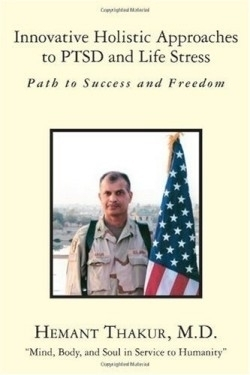Innovative Holistic Approaches to PTSD and Life Stress
Post-traumatic stress disorder (PTSD) is the scourge of countless trauma survivors. It is an insidious condition that causes emotional and physical distress to reoccur, sometimes years after the original trauma, so that victims feel trapped by the past and condemned to relive their worst moments. Any useful innovations in treatment are thus welcome to both treators and survivors. Innovative Holistic Approaches to PTSD and Life Stress offers a seasoned military psychiatrist’s take on understanding and combating PTSD.
Dr. Thakur has a wealth of experience, and he writes clearly and logically, using an approach that incorporates self-empowerment and holistic methods. But while he has assembled some useful information and workable concepts, he has unfortunately missed the mark of writing the kind of accessible, go-to type of book that someone would be likely to refer to regularly. The text relies heavily on lists, diagrams, and pie charts, and is interspersed with philosophical concepts in an uneasy hybrid that is part training manual, part Deepak Chopra. Chapters include lengthy lists, such as “12 Steps to Achieving Goals,” “Seven Human Requirements,” and “32 Governing Values,” and charts like “Laws of Action” and “Divide goals in eight sections.” These are not user-friendly, and would require a great deal of self-discipline to work with, particularly for someone struggling with PTSD symptoms. He does provide anecdotes, but more in-depth case studies would have helped bring his techniques to life.
The author may have overreached, simply because he has so much to offer about an enormous subject. This work, based in part on the author’s training efforts, reads more like a textbook than a self-help book or workbook for general readers. A clearer vision his specific audience would have better served the author to help disseminate his expertise.
Despite its flaws Innovative Holistic Approaches includes a good bibliography that nicely embraces divergent sources, including both scholarly articles and philosophical/spiritual works. It also offers good descriptions of stress, conditioned responses, and PTSD itself (although this begins on page 181 and would have been more useful in the preface). Overall, the book reinforces the case for both professionals and PTSD survivors to look beyond medication in order to maximize the potential for healing.
Reviewed by
Kristin Putchinksi
Disclosure: This article is not an endorsement, but a review. The publisher of this book provided free copies of the book and paid a small fee to have their book reviewed by a professional reviewer. Foreword Reviews and Clarion Reviews make no guarantee that the publisher will receive a positive review. Foreword Magazine, Inc. is disclosing this in accordance with the Federal Trade Commission’s 16 CFR, Part 255.

